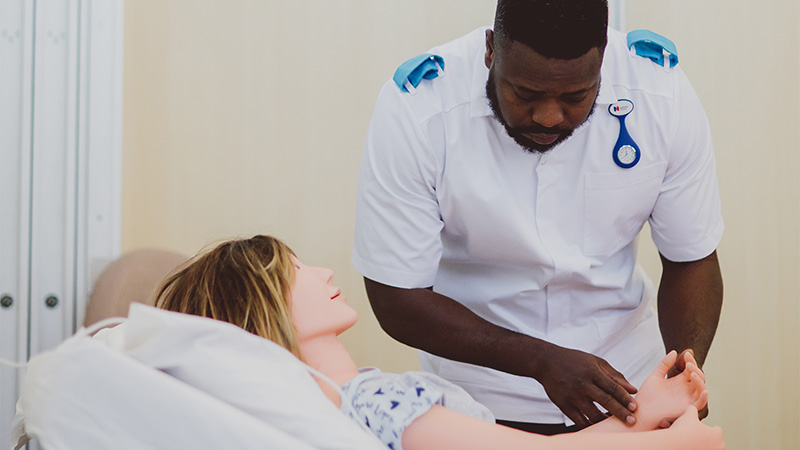Nursing (Adult)
BSc (Hons)
UCAS code: (Oxford based) B705 (Swindon based) B706
Start dates: September 2026
Full time: 3 years
Part time: 8 years maximum (limited part-time places available)
Location: Headington (Marston Road site), Swindon
School(s): Oxford School of Nursing and Midwifery
Overview
Healthcare delivery is changing fast, and adult nurses are in high demand. Working flexibly with other health and social care professionals is essential. Our adult nursing degree shows you how to care for people in a variety of settings, meeting their mental and physical health needs across their lifespan.
Our facilities let you practise nursing in immersive virtual environments. You could be responding to an accident on the streets or taking care of somebody in a nursing home. You'll then go out and do it for real.
The course has been commended by the Nursing and Midwifery Council (NMC) for our partnerships with placement organisations, and for its focus on public health.

Why Oxford Brookes University?
-
Top 3 in the UK
Nursing (Adult) is ranked 3rd in the Guardian General Nursing subject league ranking 2026.
-
Interactive facilities
Practise nursing care in augmented reality and other simulations before applying them in real scenarios.
-
Community spotlight
There’s an equal amount of focus on community and hospital nursing, and the relationship between them.
-
Placement opportunities
We have good links with local healthcare providers, which will allow you to gain practical, hands-on work experience. Your time on placement will be assessed, so employers know this experience will be reflected in your final grade.
-
Tailored support
With small class sizes, we’ll get to know you on a personal level and offer help that suits you.
-
Additional language modules
Our university-wide language programme is available to full-time undergraduate and postgraduate students on many of our courses, and can be taken as a credit on some courses.
-
Accreditation(s)
Approved by the Nursing and Midwifery Council (NMC)
Course details
Study modules
Teaching for this course takes place
Face to Face and you can expect around 15 hours of contact time per week.
In addition to this, you should also anticipate a workload of 1,200 hours per year. Teaching usually takes place Monday to Friday, between 9.00am and 6.00pm.
Contact hours involve activities such as lectures, seminars, practicals, assessments, and academic advising sessions. These hours differ by year of study and typically increase significantly during placements or other types of work-based learning.
Please note: As our courses are reviewed regularly as part of our quality assurance framework, the modules you can choose from may vary from those shown here. The structure of the course may also mean some modules are not available to you.
Careers
Once you become a registered adult nurse, you’ll have the opportunity to pursue a career in a variety of healthcare settings. Our graduates have gone on to work in many areas of the NHS and the Private, Voluntary and Independent (PVI) sector. These include cancer care units, emergency departments, and surgical and medical wards.
Some graduates work in nursing homes and hospices, as well as community settings like district nursing. Others have pursued nursing careers in the military. One of our graduates works for the World Health Organisation in Denmark, working on cross-border nursing treatment.
If you want to carry on with your studies, we offer Continuing Professional Development (CPD) and Learning Beyond Registration (LBR) opportunities. Since nurses need to be lifelong learners, you may want to consider short refresher courses or postgraduate study. Options include our MSc in Advanced Nursing Practice and Professional Doctorate in Nursing, plus PhDs and MPhils.
Student profiles
Entry requirements
Wherever possible we make our conditional offers using the UCAS Tariff. The combination of A-level grades listed here would be just one way of achieving the UCAS Tariff points for this course.
Standard offer
UCAS Tariff Points: 112
A Level: BBC
IB Points: 27
BTEC: DMM
Contextual offer
UCAS Tariff Points: 88
A Level: CCD
IB Points: 24
BTEC: MMM
Specific entry requirements
A Level: There is a requirement for a level 3 qualification in any subject
GCSE: Grade 4 (C) in English and Maths. For English and Maths, Level 2 Functional Skills are accepted as alternatives to GCSEs.
Relevant experience (e.g. in a hospital) or a suitable indication of your interest in, and understanding of, the relevant healthcare profession.
Securing a place is subject to both a satisfactory DBS and an Occupational Health clearance. If neither clearance has been completed prior to enrolment or a DBS issue has been declared on application, then enrolment may not be possible.
If enrolment has been agreed, then continuation on the programme will be contingent on satisfactory clearances.
There is a minimum age requirement of 18+ years old for applicants on this course.
Please also see the University's general entry requirements.
Screening
All applicants will be screened for fitness to practise and a Disclosure and Barring Service (DBS) check will be made.
Selection process
All Oxford Brookes University Health and Social Care Programmes conduct Value Based Recruitment (VBR). We recognise that values and attitudes have the greatest impact on the quality of people's care and their experiences.
VBR is a way of helping our Programme recruitment teams to assess the values, motives and attitudes of those who wish to work with people in health and social care settings. When we refer to values we mean, for example, the values included in the NHS constitution.
VBR focuses on 'how' and 'why' an applicant makes choices in how they act and seeks to explore reasons for their behaviour. Further details about the VBR framework.
All shortlisted applicants will be invited for an interview.
English language requirements
An IELTS score of 6.5 in all areas is required for ALL applicants whose first language is not English.
Please also see the University's standard English language requirements.
English requirements for visas
If you need a student visa to enter the UK you will need to meet the UK Visas and Immigration minimum language requirements as well as the University's requirements. Find out more about English language requirements.
Credit transfer
Many of our courses consider applications for entry part-way through the course for students who have credit from previous learning or relevant professional experience.
Find out more about transferring to Brookes. If you'd like to talk through your options, please contact our Admissions team.
Terms and conditions of enrolment
When you accept our offer, you agree to the Terms and Conditions of Enrolment. You should therefore read those conditions before accepting the offer.
International qualifications and equivalences
How to apply
Application process
Full time international applicants can also apply through UCAS
Tuition fees
Questions about fees?
Contact Student Finance on:
Tuition fees
Please note, tuition fees for Home students may increase in subsequent years both for new and continuing students in line with an inflationary amount determined by government. Oxford Brookes University intends to maintain its fees for new and returning Home students at the maximum permitted level.
For further information please see our tuition fees FAQs.
Tuition fees for International students may increase in subsequent years both for new and continuing students.
The following factors will be taken into account by the University when it is setting the annual fees: inflationary measures such as the retail price indices, projected increases in University costs, changes in the level of funding received from Government sources, admissions statistics and access considerations including the availability of student support.
How and when to pay
Tuition fee instalments for the semester are due by the Monday of week 1 of each semester. Students are not liable for full fees for that semester if they leave before week 4. If the leaving date is after week 4, full fees for the semester are payable.
- For information on payment methods please see our Make a Payment page.
- For information about refunds please visit our Refund policy page
Financial support and scholarships
All eligible nursing students on courses from September 2020 (new and continuing) will receive a payment of at least £5,000 a year which they will not need to pay back. For more information please visit NHS Learning Support Fund (LSF)
Additional costs
Please be aware that some courses will involve some additional costs that are not covered by your fees. Specific additional costs for this course are detailed below.
Extra costs
Costs that are NOT included in tuition fees are as follows:
- Books
- Binding dissertations
- Exchanges and elective modules
- Library loans and fines
- Living accommodation at university
- Graduation
- Photocopying
- Travel
This list is not exhaustive and other course-specific costs may be incurred.
For the most up-to-date information on additional costs, please keep checking the website as we will update this as further information becomes available.
Information from Discover Uni
Full-time study
Part-time study
Programme changes:
On rare occasions we may need to make changes to our course programmes after they have been
published on the website. For more information, please visit our
changes to programmes page.


